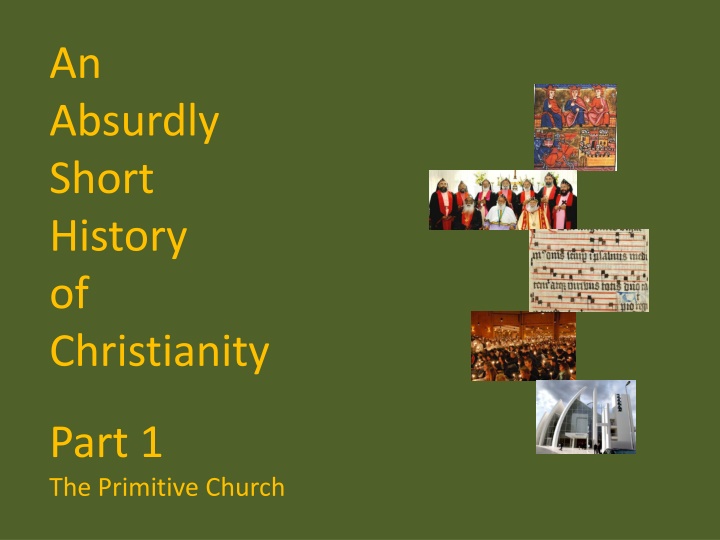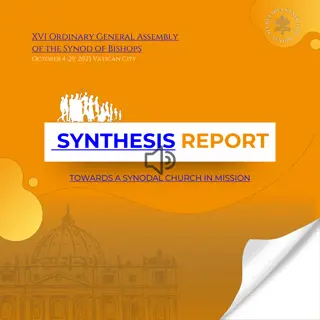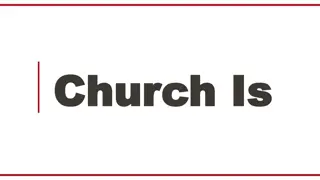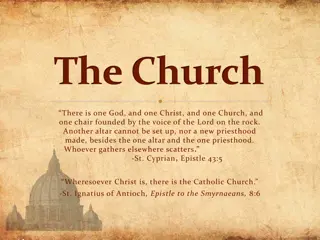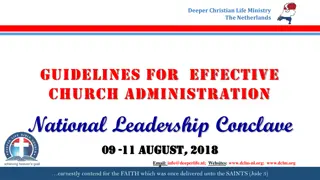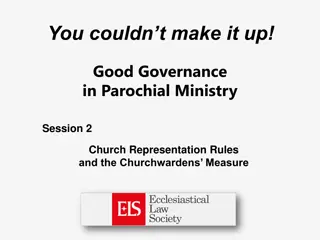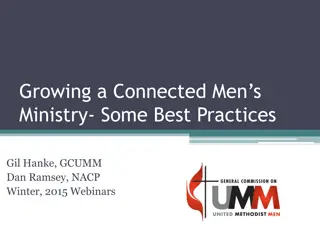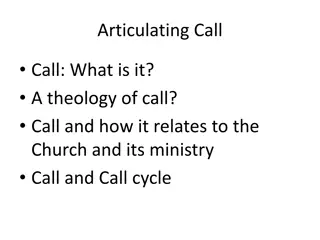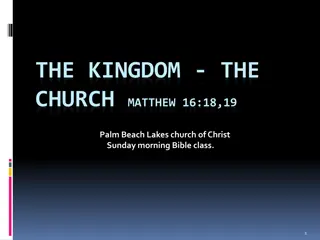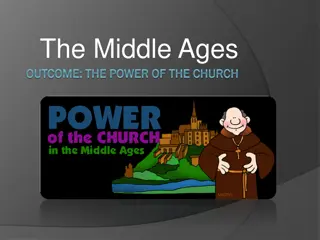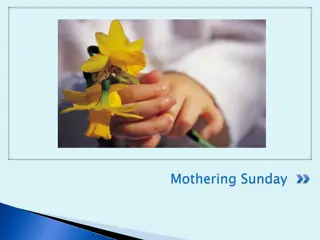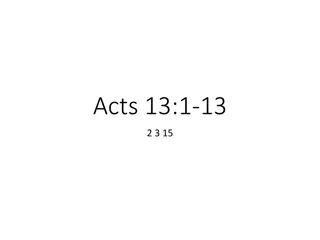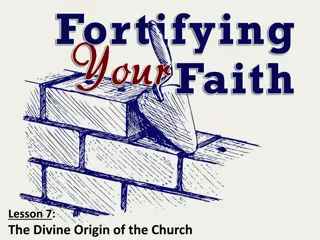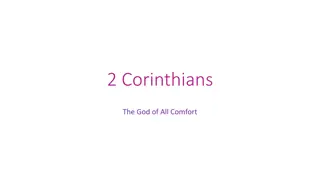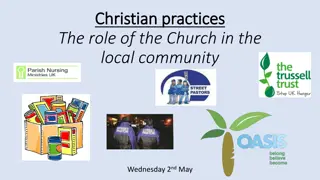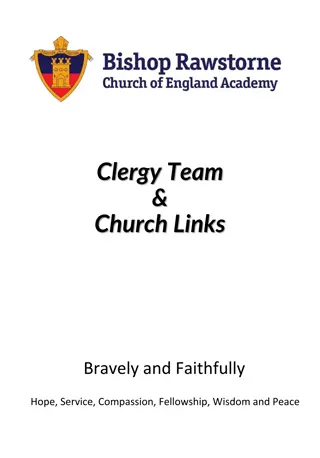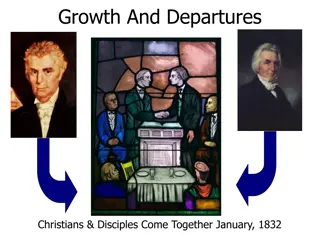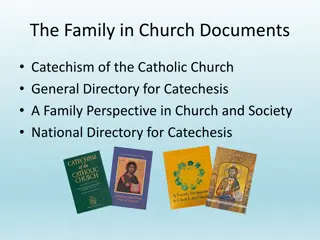A Brief Overview of Early Christian Church Development
The primitive church, from Acts to 313, showcases the beginnings of Christianity. The organizational structure and leadership roles within the early church are explored, including the differing views on who should lead - Peter or James. Speculated dates of composition for various New Testament books are also presented, shedding light on the early development of Christian texts.
Download Presentation

Please find below an Image/Link to download the presentation.
The content on the website is provided AS IS for your information and personal use only. It may not be sold, licensed, or shared on other websites without obtaining consent from the author.If you encounter any issues during the download, it is possible that the publisher has removed the file from their server.
You are allowed to download the files provided on this website for personal or commercial use, subject to the condition that they are used lawfully. All files are the property of their respective owners.
The content on the website is provided AS IS for your information and personal use only. It may not be sold, licensed, or shared on other websites without obtaining consent from the author.
E N D
Presentation Transcript
An Absurdly Short History of Christianity Part 1 The Primitive Church
Where Were Going Acts to 313 The Primitive Church 313 to 1000 The Conciliar Period 1000 to 1517 Divisions Emerge 1517 to 1700 Western Reformation 1700 to 1980 Enthusiasm and Doubt 1980 to 2016 Contraction and Renewal
Speculated dates of composition of NT books Matthew Mark Luke John Acts Romans I&II Corinthians Galatians Ephesians Philippians 80-90 68-70 80-90 90-110 95-100 57 56 55 80-90 54-55 I&II Thessalonians I&II Timothy Titus Philemon Hebrews James I&II Peter I/II/III John Jude Revelation 51-70 100 100 54-55 80-90 65-85 65-110 90-110 ??? 95
Speculated dates of composition of NT books Matthew Mark Luke John Acts Romans I&II Corinthians Galatians Ephesians Philippians 80-90 68-70 80-90 90-110 95-100 57 56 55 80-90 54-55 I&II Thessalonians I&II Timothy Titus Philemon Hebrews James I&II Peter I/II/III John Jude Revelation 51-70 100 100 54-55 80-90 65-85 65-110 90-110 ??? 95
But back to the story No formal succession plan Did Jesus think his movement would last? What organizational models did they have?
Who should lead? Matthew 16:18-19 seems to favor Peter And I tell you, you are Peter, and on this rock I will build my church, and the gates of Hades will not prevail against it. I will give you the keys of the kingdom of heaven, and whatever you bind on earth will be bound in heaven, and whatever you loose on earth will be loosed in heaven.
Who should lead? Other sources favor James Mentioned in Acts & elsewhere Paul s choice to meet with when he makes peace with the Church
But who were they? Were they Jews, or something else?
Acts 2:46 Day by day, as they spent much time together in the temple, they broke bread at home and ate their food with glad and generous hearts Acts 5:42 And every day in the temple and at home they did not cease to teach and proclaim Jesus as the Messiah. Acts 21:26 Then Paul took the men, and the next day, having purified himself, he entered the temple with them, making public the completion of the days of purification when the sacrifice would be made for each of them.
Zeal rises Stephen Paul James
70 CE An identity crisis for all and the decline of the Jerusalem church
Ebionites Paul Judaizing May have held on until almost 1000
Gentile Church Jewish Church
Outside Palestine, others decide Jewish identity as a shield
Persecution Usually local and short-lived Even official persecutions often ignored by local authorities Roman authorities usually more interested in making apostates than martyrs
Persecutions with reliable documentation up to the Edict of Constantine ~33 CE 313 CE
Raised issues in the Church What to do about those who comply with legal demands? What happens when Christians sin? What is martyrdom? Is it desirable?
Cyprian of Carthage If a man deserts the Chair of Peter upon whom the Church was built, does he think that he is in the Church? He can no longer have God for his Father who has not the Church for his Mother.
But some things stick All baptisms accepted as legitimate, even if done by those who fled or by heretics
Martyrs inspire the Church Encourage strength in times of struggle. Worry is that it might be a little too appealing???
Desert Fathers & Mothers Zen masters of Christianity Keep the Church aware of its ascetic roots Monastic models
Meanwhile, back in the Church Questions (and answers) begin about points of theology A key one: Who and what was Jesus?
Docetism Started in 2nd Century Antioch Held that Christ was spirit, and only appeared to be human How could God lower Himself to our level? John fires back with references to Christ coming in the flesh
Beginning of theological rationale Gentile Converts Pieces come together Churches in many places/ countries ???
= Legal status ??? Before 300, Christians were only about 10% of the population of the Roman Empire A few were influential, but most were not So what happened to change things?
Roman politics 283-312-ish Divide Rome into East & West
Constantine fled to England to escape court intrigue Came back with an army Met his main opponent at the Milvian Bridge Before the battle, he had a vision with the message In hoc signo vincere
Constantine in charge Edict of Milan (313) gives religious liberty to all, including Christians Christianity did not become the state religion of Rome until 380 Constantine himself did not convert until he was on his deathbed
As the scene fades to blackmany questions What happens when Christianity becomes official? How will the church handle growth? What about those who fled during the persecutions?
